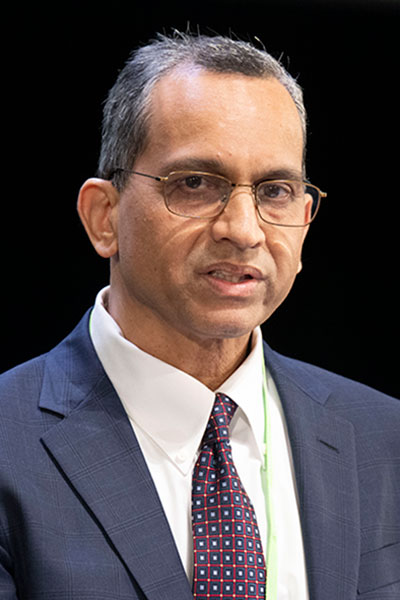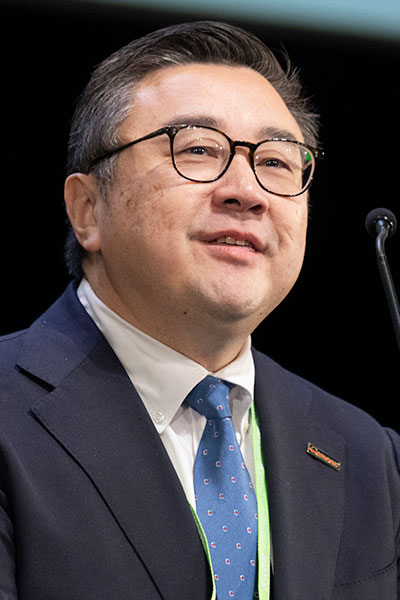First Clinical Trials Plenary studies support expansion of immunotherapy to more patients
Immunotherapy has transformed the treatment landscape in a variety of cancer types, and as demonstrated during Sunday’s Advances in Immunotherapy Clinical Trial Plenary at the AACR Annual Meeting 2025, immune-targeting treatments have the potential to help many more patients than they do now, including in place of other approaches.
KEYNOTE-689: a new standard of care in head and neck cancer?

Chaired by AACR Past President Antoni Ribas, MD, PhD, FAACR, of the UCLA Health Jonsson Comprehensive Cancer Center, and Jayesh Desai, MBBS, of the Peter MacCallum Cancer Centre, the session started with results presented by Ravindra Uppaluri, MD, PhD, of Dana-Farber Cancer Institute, Brigham and Women’s Hospital, and Harvard Medical School, that could soon prove practice-changing in patients with head and neck squamous cell carcinoma (HNSCC).
Uppaluri revealed that in the randomized phase III KEYNOTE-689 study, the addition of perioperative PD-1 inhibitor pembrolizumab (Keytruda) to surgery and standard of care adjuvant therapy increased the rate at which patients’ tumors shrunk at least 90% prior to surgery and led to longer recurrence-free survival, compared to surgery and standard of care alone. Both of these benefits were observed more frequently in patients with a PD-L1 combined positive score of 10 or more, which was associated with a 13.7% increase in major pathologic responses and a 34% reduction in risk of relapse.
“Neoadjuvant pembrolizumab followed by surgery and adjuvant pembrolizumab concurrent with and after postoperative chemoradiotherapy represents a new standard of care in the treatment of patients with resectable locally advanced head and neck cancer,” said Uppaluri.
Immunotherapy in mismatch repair-deficient solid cancers

The next two presentations, by Andrea Cercek, MD, and Yelena Y. Janjigian, MD, both of Memorial Sloan Kettering Cancer Center, investigated the application of PD-1 immunotherapy in patients with DNA mismatch repair-deficient (dMMR) solid cancers.
The phase II study led by Cercek’s team previously demonstrated the tremendous benefits of dostarlimab (Jemperli) in enabling patients with dMMR rectal cancers to avoid surgery, and this update further reinforced those results—the first 49 patients have now all had clinical complete responses that rendered surgery unnecessary. But Cercek also wanted to know, “Could we extend this benefit beyond rectal cancer to all solid cancers that were mismatch repair-deficient? And if [patients] had a clinical complete response, could we also manage these patients nonoperatively?”

Impressively, 65% of patients with dMMR non-rectal cancers also experienced complete clinical responses and although few patients had yet to reach two-year follow-up, 85% of those who had were still free of recurrence. These groundbreaking results were published simultaneously during the conference in the New England Journal of Medicine, and Cercek believes this approach might ultimately be able to eliminate the need for surgery in 2% to 3% of patients with solid cancers.
Janjigian showed that patients with dMMR cancers at risk of relapse after surgery might also benefit from PD-1 blockade, according to a phase II trial in which patients with detectable ctDNA six to 10 weeks after surgery received pembrolizumab. Of the 13 patients treated with immunotherapy, 11 had no detectable ctDNA at six months, eight were still relapse-free at a median follow-up of 32.1 months, and two-thirds were still alive at two years.
“This study provides the first prospective evidence that immune checkpoint inhibitors can clear minimal residual disease before clinical recurrence, highlighting ctDNA as a dynamic tool to guide treatment in early-stage cancers,” Janjigian said.
Combining PARP and PD-1 inhibition in KEYLYNK-007

Timothy A. Yap, MBBS, PhD, of The University of Texas MD Anderson Cancer Center, concluded the session with a talk on the phase II KEYLYNK-007 trial, in which pembrolizumab in combination with the PARP inhibitor olaparib (Lynparza) was given to patients whose cancers were characterized by compromised DNA repair capabilities, due to homologous recombination repair mutations (HRRm) and/or homologous recombination deficiency (HRD).
Inhibition of both PD-1 and PARP—which, Yap noted, HRRm and HRD cancer cells rely on to repair their DNA—led to antitumor responses in this tumor-agnostic study, particularly in patients with mutations in BRCA1 or BRCA2.
When asked by an audience member about how current methods for the identification of HRRm and/or HRD might underestimate the true population, Yap expressed the need for better assays that are “more reflective of current day biology” to detect this phenomenon and identify all patients in these populations.
The recording of the full session is available for registered Annual Meeting attendees through October 2025 on the virtual meeting platform.
More from the AACR Annual Meeting 2025
View a photo gallery of scenes from Chicago, continue the conversation on social media using the hashtag #AACR25, and read more coverage in AACR Annual Meeting News.

